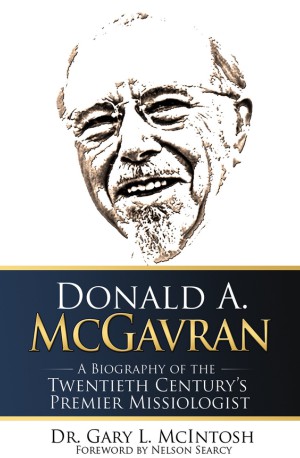Donald A. McGavran - a biography
Disappointing biography of the 20th century’s premier missiologist, in that it doesn't focus on McGavran as a person
 Donald A. McGavran: A Biography of the Twentieth Century’s Premier Missiologist
Donald A. McGavran: A Biography of the Twentieth Century’s Premier Missiologist
By Gary L. McIntosh
Church Leader Insights, USA
ISBN 978-0-9885241-3-2
Reviewed by Paul Beasley-Murray
In the late 1970s and then into the 1980s, ‘church growth’ was all the rage among evangelical Christian leaders. The then church growth movement owed its origins to an American called Donald McGavran, who in the 1930s went to India was a missionary. He asked two simple questions in particular: (1) Why do some churches grow, while others in a similar context do not? (2) Why does the same church grow at one time and not at another?
McGavran’s research led to his writing a number of books, culminating in his magnum opus, Understanding Church Growth (Eerdmans, Grand Rapids 1970). In 1961 McGavran founded the Institute of Church Growth in Eugene Oregon. Later in 1965 this Institute moved to Fuller Theological Seminary in Pasadena, California, to be part of the School of World Missions. Its objective was “to train ‘career’ missionaries and make them more effective in spreading the Gospel and in planting new churches”.
At that stage ‘church growth’ had the developing world in its sights. It was only later that church growth principles were applied to the North American – and then to the British – scene.
Like many other Baptist ministers of my era, I read McGavran’s Understanding Church Growth, and so was delighted to be given the opportunity to review his biography. However, I confess that I was greatly disappointed. This book is not really about McGravan as a person, but rather about McGravan as a church growth theoretician. Did McGavran have any interests in life beyond his work? How important was his family to him? The book does not say.
The author is a professor of Christian ministry and leadership at the Talbot School of Theology in California, and writes primarily about McGavran’s influence on the churches of North America. But even within that somewhat narrow perspective, the book is disappointing because it lacks a ‘critical’ perspective. Sadly this ‘biography’ will be of limited appeal to British readers.
The Revd Dr Paul Beasley-Murray retired from full-time stipendiary ministry in 2014. His reflections on a 43-year career in ministry are available in a four volume guide called Living out the Call.
Baptist Times, 08/09/2017